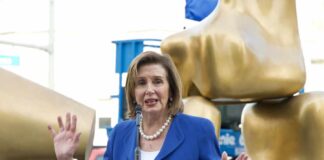
An upcoming movie is facing a political minefield, despite the director and actors’ best intentions, as the modern media makes its usual attempt to make everything about their politics.
The movie “Civil War” takes place in a modern version of America where many states have seceded from the Union and now make up several distinct factions. The story follows a group of journalists trying to make it to the White House to report on the ongoing civil war.
One of the film’s stars, Kirsten Dunst, was interviewed by Variety Magazine, who desperately wanted to make the movie about former President Donald Trump.
Kirsten Dunst Confronts 'Civil War’ Hysteria, Hollywood Pay Gaps and the Media Dividing America: 'Everything Is Broken' https://t.co/iBwM5GzWct
— Variety (@Variety) April 3, 2024
“I don’t want to compare because that’s the antithesis of the film. It’s just a fascist president.” Dunst says when pressed about the politics of the movie, “But I didn’t think about Nick’s character being any certain political figure. I just thought this is this president, in this world, who will not abide by the Constitution and democracy.”
“Dunst won’t admit that the film’s president, played by Nick Offerman as a narcissist with an authoritarian streak, resembles the 45th, and perhaps 47th, Oval Office occupant,” the magazine claims in response.
The media is desperate to make this movie political, despite the best efforts of everyone involved.
“It feels like I have to be on guard,” Dunst said near the end of the interview, “The fact that people are losing their agents because they have a political standpoint — it feels scary.”
Dunst isn’t the only actor from the movie pushing back against the media’s spin. When asked by The Hollywood Reporter whether the film is related to current events, Nick Offerman, who plays the fascist president, said:
“[The movie] is so unrelated to any actual factions or politicians. That’s what I think is so brilliant about this film. Everybody on any side of the aisle or any faction has a lot to say, and we’re all immediately divisive and partisan in our conversations. Everybody’s mad about those other jerks, and this movie transcends that. It’s about all of us. And I’m so grateful for that.”
Offerman goes on to point out how easily the film could have included a nod towards either side of American politics, but consciously chooses not to. In the end, this careful balancing act serves to deliver the movie’s message warning against extreme partisanship and war.
The film’s British director, Alex Garland, has also tried to avoid making the film into a partisan political statement — rare for modern directors.
“I could have made it into something that explains every beat in the way that lots of movies do, and that’s okay, if they want to do that,” Garland said after a screening of the movie about his choice to avoid writing a specific political context. “That’s fine. But it didn’t feel appropriate for this. And it’s not in the nature of a conversation. I wanted this film to be finding points of agreement between everybody, hopefully.”
“Civil War” will be in theaters on April 12.

































